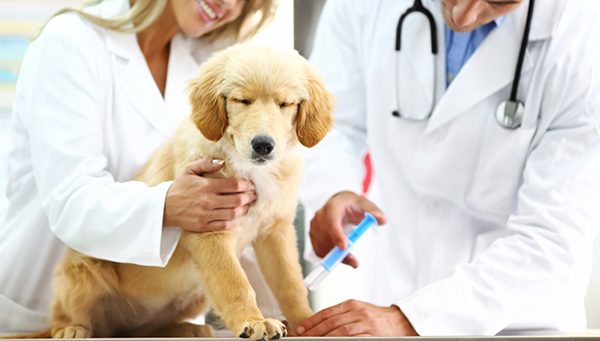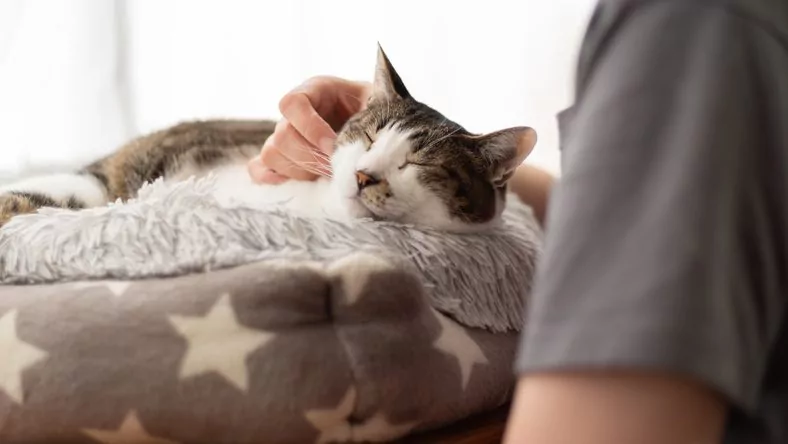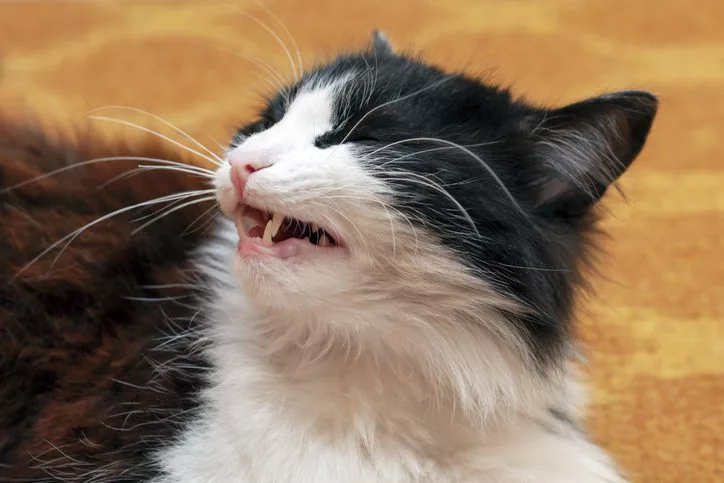Most Important Puppy Shots for Pet Owners in Raleigh, NC
One of the most important duties of new puppy owners is to have their dog get all of their shots and vet exams. This ensures that your new pet is healthy and happy. In addition, getting your dog all of the recommended vaccines prevents your dog from getting sick. This will leave many new dog owners asking themselves: what are the most important puppy shots?
The core vaccines are the most important vaccines to give your puppy and stay up to date on. However, there are some non-core vaccines that your vet may suggest that you give your puppy as well. These may be suggested because the disease in question is prevalent in your area, your dog’s lifestyle may put them at higher risk, or because your puppy has a weaker immune system than normal.

In this article, we will be explaining what puppy shots are the most important for your new friend to get. In addition to this, we will be listing the non-core vaccines and explaining how often your dog should get their booster shots as well. Let’s get right into it!
Why Should You Vaccinate Your Puppy?
It is crucial that you get your puppy vaccinated and keep their booster shots up to date for their entire lives. This is so important because it greatly reduces their risk of catching and spreading serious diseases, many of which can be deadly. Protecting your puppy from these kinds of pathogens ensures that they will live a healthy life that is free from these illnesses.
In addition to this, many dog related businesses such as dog groomers, doggy daycares, and even dog training facilities will require that your dog is vaccinated. They may even include non-core vaccines along with the core vaccines depending on the business and the area that it is located in.
What Are The Core Puppy Shots?
There are several core vaccines for dogs in the United States. These are the Rabies vaccine and the DAPP vaccine, and the Bordetella vaccine. Of course, the Rabies and Bordetella vaccines will respectively protect your dog against the Rabies and Bordetella viruses.
And meanwhile, the DAPP vaccine will protect your dog from four different diseases. These include distemper, adenovirus, parainfluenza, and parvovirus. Considering how life threatening all these illnesses are, it is understandable that they are considered essential vaccines.
Are There Other Puppy Shots?
Yes, there are other puppy shots in addition to the rabies and DAPP core vaccines. Although these vaccines are not necessarily mandatory, your vet may still recommend that your puppy gets them.
This is especially true if a specific disease is prevalent in your area or if your dog’s lifestyle puts them at risk. Things like traveling, hiking, having your dog spend a lot of time in rural areas, and even just having your dog spend a lot of time with other dogs can put your dog more at risk of contracting illnesses. Here are the non-core vaccines available to dogs and puppies in the United States.
- Lyme disease vaccine
- Leptospirosis vaccine
- Canine influenza vaccine (comes in two variants: H3N2 and H3N8.)
If you are unsure if your dog needs any non-core vaccines, or if you do not know which ones you need you should consult with your veterinarian. A good vet will know which non-core vaccines your pup needs based on where you live, your puppy’s lifestyle, and your puppy’s overall health.
How Often Does My Puppy Need These Shots and When Should They Get Them? What About Adult Dogs?
Like in humans, puppies and adult dogs will need booster shots routinely to keep them protected against the illnesses that they are vaccinated for. Puppies will need booster shots more often than adult dogs. Puppies will typically need a series of booster shots every few weeks, and adult dogs will need most of their booster shots once a year to every 3 years depending on the vaccine.
Here we have provided a table with both core and non-core vaccines and when your dog should get them based on their age.
6-8 Week Old Puppy
- DAPP (core vaccine)
- Bordetella (non-core vaccine)
Notes: Ask for records of any vaccines your pup may have received prior to you adopting them and provide those to your veterinarian.
10-12 Week Old Puppy
- DAPP 2nd dose (core vaccine)
- Bordetella final dose (core vaccine)
- Leptospirosis (non-core vaccine)
- Lyme Disease (non-core vaccine)
- Canine Influenza (non-core vaccine)
14-16 Week Old Puppy
- DAPP 3rd dose (core vaccine)
- Rabies (core vaccine)
- Leptospirosis (non-core vaccine)
- Lyme Disease (non-core vaccine)
- Canine Influenza (non-core vaccine)
Notes: The 3rd dose of DAPP is usually given at 16 weeks or later. Rabies may be given earlier depending on location.
Annual Shots for Adult Dogs
- Leptospirosis (non-core vaccine)
- Lyme Disease (non-core vaccine)
- Bordetella (non-core vaccine)
- Canine Influenza (non-core vaccine)
Notes: In some cases the Bordetella vaccine is given every 6 months instead of annually.
Shots Needed Every 3 Years for Adult Dogs
- Rabies (core vaccine)
- DAPP (core vaccine)
Notes: Only after your dog has received the initial rabies vaccines.
Make Sure Your Puppy Gets All Their Shots in Raleigh, NC
If you are ever wondering about how often your puppy or adult dog needs their booster shots and when they should get them, you should always ask your vet. They will know what shots your puppy or adult dogs should get, when they should get them, and how often.
Every dog has a unique situation, and some dogs may need more vaccines than others. As a result, you should always get your dog vaccinated with a veterinarian’s guidance. As a rule of thumb puppies typically need booster shots every few weeks, and adult dogs typically need their shots given once a year.
The only exception to this is the Rabies and DAPP shots after your dog has gotten the initial vaccine. After that, these two vaccines should only be given to your dog every three years.
Recent Posts
Managing Cat and Dog Anxiety During the Holidays
Managing Cat and Dog Anxiety During the Holidays Let’s face it: our pets are part of our…
Managing and Treating Joint Pain in Senior Pets
Managing and Treating Joint Pain in Senior Pets November is Senior Pet Month, and it’s the purr-fect…
Dog Flu: Recognizing Canine Influenza Symptoms and Care Tips
Dog Flu: Recognizing Canine Influenza Symptoms and Care Tips We know you consider your furry family members…
Cat Drooling: What Cat Owners Need to Know
Cat Drooling: What Cat Owners Need to Know When it comes to our feline friends, a little…
Why is My Cat Sneezing So Much in Raleigh, NC?
Why is My Cat Sneezing So Much in Raleigh, NC? Like us humans, sometimes our pets sneeze…
About Bowman Animal Hospital & Cat Clinic
Established in 1986 by Dr. Gale Bowman, Bowman Animal Hospital and Cat Clinic is dedicated solely to the health and well-being of our pet community. We are a team of compassionate veterinarians and pet lovers who invest our time and resources into providing the very best medical care to your pet.






